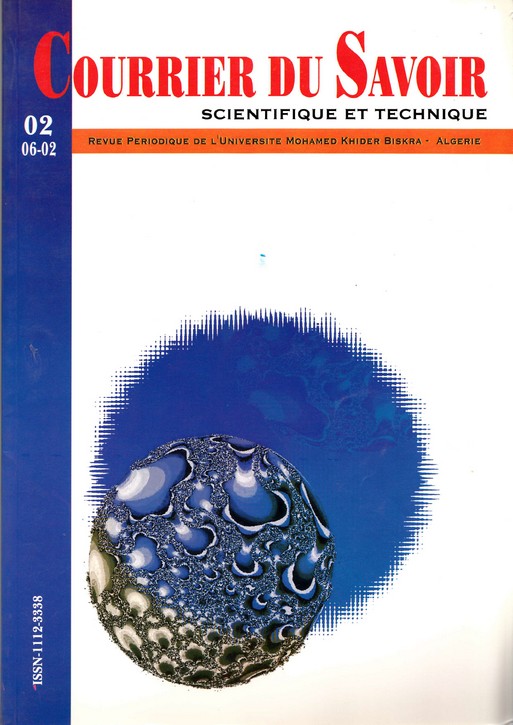COMMANDE ADAPTATIVE FLOUE POUR LES SYSTEMES NON LINEAIRES INCERTAINS
Résumé
Dans cet article, une approche combinant la commande adaptative classique et la commande floue, est utilisée
pour prendre en charge des systèmes non linéaires incertains. En effet les descriptions linguistiques décrivant le
fonctionnement du système sont incorporées dans le contrôleur. Les paramètres de ce dernier sont ajustés par des
lois d’adaptation appropriées. Pour garantir la stabilité des systèmes en boucle fermée, dans le sens que tous les
signaux impliqués sont uniformément bornés, la conception du contrôleur est faite selon la synthèse de
Lyapunov.
L’algorithme ainsi développé est appliqué pour réaliser une commande en poursuite d’un pendule inversé. Les
simulations sont réalisées sous l’environnement MATLAB 5.3.
Références
[1] H. Bühler «Réglage par logique floue», Presses
universitaires polytechniques romandes, Suisse
1994.
[2] B.S. Chen, H.J. Uang, and C.S. Tseng “Robust
tracking enhancement of robot systems including
motor dynamics : A fuzzy-based dynamic game
approach,” IEEE Trans. Fuzzy Syst. vol. 6, pp.
538-552, Nov. 1998.
[3] R. Hartani, H.T. Nguyen et B. Bouchon- Meunier,
“Sur l’approximation universelle des systèmes
flous,” RAIRO-APII-JESA, vol. 30, n°5, pp. 645-
663 , 1996.
[4] A. Isidori, Nonlinear Control Systems. Springer –
Verlag London, 1995.
[5] A. Isidori, Nonlinear Control Systems II. Springer
–Verlag London, 1999.
[6] F. Khaber, A. Hamzaoui, K. Benmahammed &
J.L. Sculfort, “Contrôle flou et stabilité d’un
portique avec masse suspendue,” CNR-IUT 09-10
juin 2000.
[7] F. Khaber, A. Hamzaoui, K. Benmahammed,
“Commande floue d’un système non linéaire,”
CIP’2001, 09-11 juin 2001.
[8] H.K. Khalil, Nonlinear Systems. Englewood
Cliffs, NJ: Prentice-Hall, 1996.
[9] B.B. Kook and W. Chul Ham, “Adaptive Control
of Robot Manipulator Using Fuzzy Compensator,”
IEEE trans. on Fuzzy Systems, vol. 8, n° 2, April
2000, pp. 718-737.
[10] C.C. Lee, “Fuzzy Logic in Control Systems:
Fuzzy Logic Controller—Part I and II,” IEEE
Trans. Syst. Man. Cybern. Vol. 20, no. 2, pp. 404-
435, 1990.
[11] H. Lee and M. Tomizuka , “Robust adaptive
control using a universal approximator for SISO
nonlinear systems,” IEEE Trans. Fuzzy Syst. vol.
8, no. 1, pp. 95-106, Feb. 2000.
[12] C. Melin et B. Vidilov « Stabilisation de systèmes
par des contrôleurs flous (Partie I) ,” RAIROAPII-
JESA, vol. 30, n°5, pp. 679-705, 1996.
[13] S.S. Sastry and M. Bodson, Adaptive Control :
Stability, Convergence and Robusteness.
Englewood Cliffs, NJ: Prentice-Hall, 1989.
[14] J.E. Slotine and W. Li, Applied Nonlinear
Control. Englewood Cliffs, NJ: Prentice-Hall,
1991.
[15] L. X. Wang, “Fuzzy Systems are universal
Approximators,” IEEE trans. on Fuzzy Systems,
vol. 5, n° 8, May 1992, pp. 1164-1173
[16] L.X. Wang, “Stable Adaptive Fuzzy Control of
Nonlinear Systems,” IEEE Trans. Fuzzy Syst. vol.
1, pp. 146-155, 1993.
[17] L. X. Wang, “Adaptive Fuzzy Systems and
Control: Design and Stability Analysis,”
Englewood Cliffs. NJ: Prentice-Hall, 1994.
[18] L. X. Wang, “Stable Adaptive Fuzzy Controllers
with Application to Inverted Pendulum Tracking,”
IEEE trans. on Man and Cybernetics, Part B:
Cybernetics. Vol. 26, n° 5, October 1996, pp. 677-
691.
[19] L. X. Wang, “A Course in Fuzzy Systems and
Control,”
universitaires polytechniques romandes, Suisse
1994.
[2] B.S. Chen, H.J. Uang, and C.S. Tseng “Robust
tracking enhancement of robot systems including
motor dynamics : A fuzzy-based dynamic game
approach,” IEEE Trans. Fuzzy Syst. vol. 6, pp.
538-552, Nov. 1998.
[3] R. Hartani, H.T. Nguyen et B. Bouchon- Meunier,
“Sur l’approximation universelle des systèmes
flous,” RAIRO-APII-JESA, vol. 30, n°5, pp. 645-
663 , 1996.
[4] A. Isidori, Nonlinear Control Systems. Springer –
Verlag London, 1995.
[5] A. Isidori, Nonlinear Control Systems II. Springer
–Verlag London, 1999.
[6] F. Khaber, A. Hamzaoui, K. Benmahammed &
J.L. Sculfort, “Contrôle flou et stabilité d’un
portique avec masse suspendue,” CNR-IUT 09-10
juin 2000.
[7] F. Khaber, A. Hamzaoui, K. Benmahammed,
“Commande floue d’un système non linéaire,”
CIP’2001, 09-11 juin 2001.
[8] H.K. Khalil, Nonlinear Systems. Englewood
Cliffs, NJ: Prentice-Hall, 1996.
[9] B.B. Kook and W. Chul Ham, “Adaptive Control
of Robot Manipulator Using Fuzzy Compensator,”
IEEE trans. on Fuzzy Systems, vol. 8, n° 2, April
2000, pp. 718-737.
[10] C.C. Lee, “Fuzzy Logic in Control Systems:
Fuzzy Logic Controller—Part I and II,” IEEE
Trans. Syst. Man. Cybern. Vol. 20, no. 2, pp. 404-
435, 1990.
[11] H. Lee and M. Tomizuka , “Robust adaptive
control using a universal approximator for SISO
nonlinear systems,” IEEE Trans. Fuzzy Syst. vol.
8, no. 1, pp. 95-106, Feb. 2000.
[12] C. Melin et B. Vidilov « Stabilisation de systèmes
par des contrôleurs flous (Partie I) ,” RAIROAPII-
JESA, vol. 30, n°5, pp. 679-705, 1996.
[13] S.S. Sastry and M. Bodson, Adaptive Control :
Stability, Convergence and Robusteness.
Englewood Cliffs, NJ: Prentice-Hall, 1989.
[14] J.E. Slotine and W. Li, Applied Nonlinear
Control. Englewood Cliffs, NJ: Prentice-Hall,
1991.
[15] L. X. Wang, “Fuzzy Systems are universal
Approximators,” IEEE trans. on Fuzzy Systems,
vol. 5, n° 8, May 1992, pp. 1164-1173
[16] L.X. Wang, “Stable Adaptive Fuzzy Control of
Nonlinear Systems,” IEEE Trans. Fuzzy Syst. vol.
1, pp. 146-155, 1993.
[17] L. X. Wang, “Adaptive Fuzzy Systems and
Control: Design and Stability Analysis,”
Englewood Cliffs. NJ: Prentice-Hall, 1994.
[18] L. X. Wang, “Stable Adaptive Fuzzy Controllers
with Application to Inverted Pendulum Tracking,”
IEEE trans. on Man and Cybernetics, Part B:
Cybernetics. Vol. 26, n° 5, October 1996, pp. 677-
691.
[19] L. X. Wang, “A Course in Fuzzy Systems and
Control,”
Comment citer
KHABER, F.; HAMZAOUI, A..
COMMANDE ADAPTATIVE FLOUE POUR LES SYSTEMES NON LINEAIRES INCERTAINS.
Courrier du Savoir, [S.l.], v. 2, avr. 2014.
ISSN 1112-3338.
Disponible à l'adresse : >https://revues.univ-biskra.dz/index.php/cds/article/view/202>. Date de consultation : 26 avr. 2024
Rubrique
Articles


